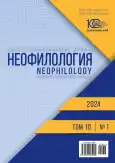Ergonyms of the thematic group “Educational institutions” of Naberezhnye Chelny
- Authors: Sokolova I.A.1
-
Affiliations:
- Naberezhnye Chelny Institute (Branch) of the Kazan (Volga region) Federal University
- Issue: Vol 10, No 1 (2024)
- Pages: 76-83
- Section: ONOMASTICS
- URL: https://journal-vniispk.ru/2587-6953/article/view/295566
- DOI: https://doi.org/10.20310/2587-6953-2024-10-1-76-83
- ID: 295566
Cite item
Full Text
Abstract
INTRODUCTION. At the present stage of studying proper names, a special place is given to urban ergonyms, which form the urban onomasticon. Ergonyms, being an integral part of the appearance of a modern city, reflect not only the lexical and grammatical systems of the language, but also represent scientific value as an additional source of information about the social, cultural and historical situation in a certain territory. The purpose of the study is to describe the ergonymic space of Naberezhnye Chelny, Republic of Tatarstan, which includes the names of educational institutions.MATERIALS AND METHODS. The research material is the modern names of educational institutions from the official website of the directory of organizations of the city of Nab erezhnye Chelny 2023. The factual material analysis is carried out based on the use of general li nguistic methods (structural and descriptive), as well as the use of elements of the synchronic method and nominative technique analysis.RESULTS AND DISCUSSION. The main technique for creating new ergonyms is symbolic nomination, which is expressed in nomination using metaphor and metonymy. The emergence of innovative ergonyms in the urban space of Naberezhnye Chelny is mainly associated with the appearance of names in the Tatar language, but with the presence of spellings of words dating back to the English language and Russian words in English transcription. The study of urban ergonoms is carried out in three aspects: analysis of the nominative appearance of a modern city, analysis of thematic groups of urban ergonyms and identification of the peculiarities of the functioning of ergonyms in the speech of modern citizens.CONCLUSION. The names of various children's and youth clubs serve as a certain attribute to attract the target audience. Basically, secondary educational institutions in the city of Naberezhnye Chelny are called by a certain number, but there are a number of specialized institutions that have a name in the Tatar language, indicating the essence of these schools. The city names of additional education institutions for school-aged children reflect Russian names, many of which remain from the Soviet past. Onimization is carried out using metaphorical components in order to expand the semantic structure of the word, its functionality, and the significance of ergonymic vocabulary in communication.
About the authors
I. A. Sokolova
Naberezhnye Chelny Institute (Branch) of the Kazan (Volga region) Federal University
Author for correspondence.
Email: e.a.sokolova-fardeeva@mail.ru
ORCID iD: 0000-0001-9661-029X
Senior Lecturer of Philology Department
68/19 Mira Ave., Naberezhnye Chelny, 423800, Republic of Tatarstan, Russian FederationReferences
- Vepreva I.T. Modern Russian Ergonymii: in Search for New Forms. Voprosy onomastiki = Problems of Onomastics, 2019, vol. 16, no. 4, pp. 168-179. (In Russ.) https://doi.org/10.15826/vopr_onom.2019.16.4.051, https://elibrary.ru/nlqeas
- Zelenina T.I., Butorina N.V. Communicative and pragmatic aspects of ergonyms (based on the linguistic material of the Russian language). Vestnik Udmurtskogo universiteta. Seriya Istoriya i filologiya = Bulletin of Udmurt University. History and Philology Series, 2016, vol. 26, no. 6, pp. 50-53. (In Russ.) https://elibrary.ru/xryqbn
- Zueva T.A., Okolizdaeva A.A. Precedent ergonyms as a component of onomastic space of a modern city. Linguistica Juvenis, 2021, pp. 97-110. (In Russ.) https://elibrary.ru/vsklue
- Kryzhanovskaya V.A. Ehrgonimy s ehlementami graficheskoi transformatsii: strukturno-semanticheskii i pragmaticheskii aspekty: dis. … kand. filol. nauk [Ergonyms with Elements of Graphic Transformation: Structural-Semantic and Pragmatic Aspects. PhD (Philology) diss.]. Krasnodar, Kuban State University Publ., 2017, 241 p. (In Russ.) https://elibrary.ru/ldmlid
- Markheeva T.V. Linguomarketing approach in the research of Ulan-Ude ergonyms. Vestnik Buryatskogo gosudarstvennogo universiteta. Yazyk. Literatura. Kul’tura = Bulletin of the Buryat State University. Lan-guage. Literature. Culture, 2020, no. 1, pp. 52-56. (In Russ.) https://elibrary.ru/ylccqy
- Salimova D.A. Tendencies of lingual creativity in forming the contemporary ergonymicon: taking the new ergonyms in bilingual Kazan as an example. Mnogoyazychie v obrazovatel’nom prostranstve = Russian Journal of Multilingualism and Education, 2023, vol. 15, no. 2 (17), pp. 203-208. (In Russ.) https://doi.org/10.35634/2500-0748-2023-15-2-203-208, https://elibrary.ru/hbrple
- Feiskhanova T.R. Yazykovaya igra kak sredstvo sozdaniya ehrgonimov [Language game as a means of creating ergonyms]. Sovremennye tendentsii razvitiya nauki i tekhnologii [Modern Trends in the Develop-ment of Science and Technology], 2017, no. 3–6, pp. 70-72. (In Russ.) https://elibrary.ru/ykrkkx
- Shavlyuk V.B. About the structure of ergonyms. Vestnik Nizhegorodskogo universiteta im. N.I. Lo-bachevskogo = Bulletin of Lobachevsky University of Nizhni Novgorod, 2019, no. 6, pp. 253-256. (In Russ.) https://elibrary.ru/hmtmra
- Ismagilova A.R., Palutina O.G., Pupyreva S.O., González J.M. Linguistic diversity of multicultural cities on the materials in Barcelona ergonyms. Utopia y Praxis Latinoamericana Universidad del Zulia, 2020, vol. 25, pp. 522-529. http://doi.org/10.5281/zenodo.3784912
- Solnyshkina M.I. Ergonyms as a mirror of cultural values. The Case of Kazan (Tatarstan) SGEM 2014 Scientific SubConference on Psychology and Psychiatry, Sociology and Healthcare, Education. Kazan, 2014, pp. 295-302.
- Felecan O., Bugheșiu A. Names and Naming: Multicultural Aspects. Cham, Palgrave Macmillan Publ., 2021, 490 p. https://doi.org/10.1007/978-3-030-73186-1
- Shcherbak A.S. Universal property of urbanonymical categorization. Neofilologiya = Neophilology, 2018, vol. 4, no 13, pp. 5-11. https://elibrary.ru/yvlvop
Supplementary files









